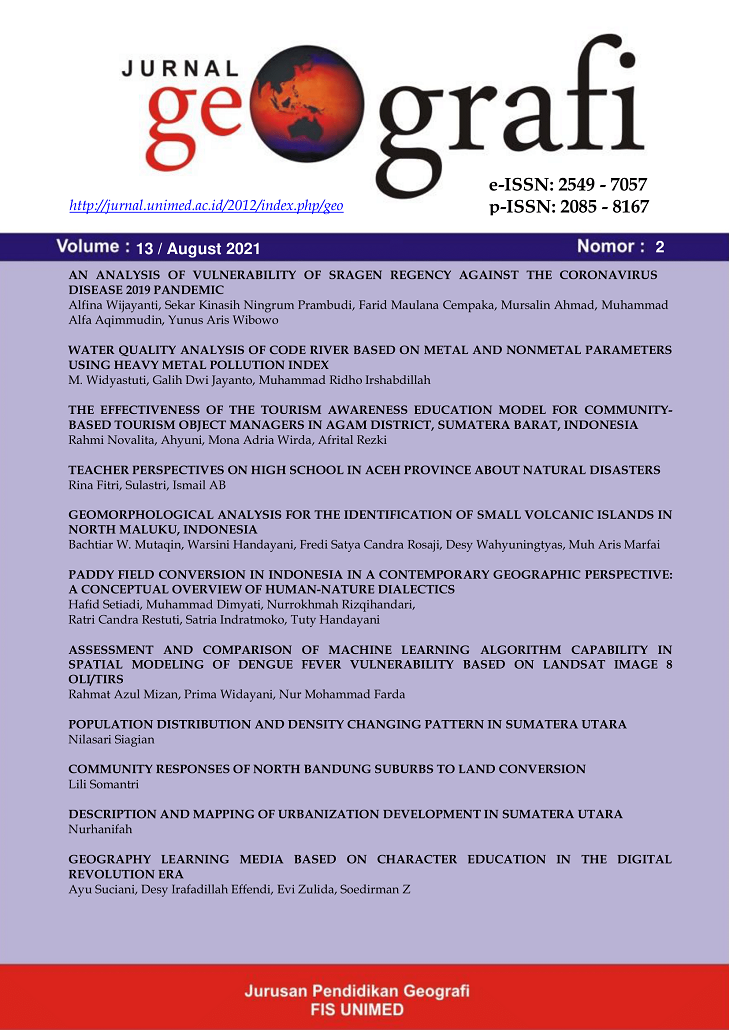THE EFFECTIVENESS OF THE TOURISM AWARENESS EDUCATION MODEL FOR COMMUNITY-BASED TOURISM OBJECT MANAGERS IN AGAM DISTRICT, WEST SUMATRA, INDONESIA
DOI:
https://doi.org/10.24114/jg.v13i2.23989Abstract
This research aims to describe the design of the community-based tourism awareness education model and the effectiveness of the tourism awareness education model. This research is included in the Research and Development (R&D) type of research utilizing the ADDIE model. The population was a community-based tourist attraction manager, amounting to 20 people with the incidental sampling technique, divided into 2 groups. The results showed that: 1) the design of a community-based tourism awareness education model consisted of; candidate participants and selection of potential participants with the preparation stage including; a) objectives, materials, strategies, procedures, media, teaching materials, evaluation, b) socialization of program introduction, c) program implementation, and d) mentoring; 2) the effectiveness of the community-based tourism awareness education model was seen from the test results of participants which showed that there were differences in the results before and after education, where after education a higher average value was obtained, with a smaller standard deviation. Although divided into 2 groups, the educational results showed no significant difference between the post-test scores in group 1 and group 2. This proves that education has been effective in providing awareness for community-based object managers.Keywords: Effectiveness, Tourism Awareness Education Model, Community-based Tourism Object Manager, ADDIE ModelReferences
Ansyar, M. (2015). Kurikulum Hakikat, Fondasi, Desain dan Pengembangan (Cetakan 1). Jakarta: PT. Kencana.
Darmawan, R. (2008). Skala Pengukuran Variabel-Variabel Penelitian. Bandung; Alfabeta
Dick, W. & Carey, L. (2001). The Systematic Design of Instruction. United States: Addison-Wesley Educational Publishers Inc.
Direktorat Tenaga Kependidikan Direktorat Jenderan Peningkatan Mutu Pendidikan Dan Tenaga Kependidikan Departemen Pendidikan Nasional. (2008). œPenulisan modul. Jakarta
Febriani, M. F. (2018). Keterlibatan Masyarakat dalam Pengembangan Objek Wisata Di Kecamatan Lubuk Alung dan Batang Anai Kabupaten Padang Pariaman (Studi Kasus: Air Terjun Nyarai, Tapian Puti dan Rumah Pohon Manang). JURNAL BUANA, 2(1), 205-205.
Kabilan, M. K., Adlina, W. F. W., & Embi, M. A. (2011). Online collaboration of English language teachers for meaningful professional development experiences. English Teaching: Practice and Critique, 10(4), 94-115.
Kementrian Pariwisata dan Kebudayaan. (2016). Pedoman Kelompok Sadar Wisata. Jakarta. Kementerian Pariwisata.
Lee, H.-J. & Lim, C. (2012). Peer Evaluation in Blended Team Project-Based Learning; What Do Students Find Important? Educational Technology & Society, 15(4), 214“224Morrison, G. R. (2010). Designing Effective Instruction (6th Edition.). John Wiley & Sons.
Nadiyah, R. S., & Faaizah, S. (2015). The development of online project-based collaborative learning using ADDIE model. Procedia-Social and Behavioral Sciences, 195, 1803-1812.
Narwoko, D., & Suyanto, B. (2007). Sosiologi Teks Pengantar Dan Terapan: Jakarta. Kencana, Prenada Media Group.
Novalita R. (2018). Object management Response to Practicality Conscious Tourism Educational Module. Prosiding Seminar Nasional Biologi Edukasi. ISSN 2579-7766.
Novalita, R. (2019). Praktikalitas Modul Pendidikan Sadar Wisata Bagi Pengelola Objek Wisata Berbasis Masyarakat Di Kabupaten Agam Sumatera Barat. Jurnal Spasial, 6, 62-67.
Novalita, R., Barlian, E., Muchtar, B., & Syah, N. (2018). Design of a tourism awareness education module for tourism attraction managers in Agam District, West Sumatra. African Journal Hospitality, Tourism and leisure, 3.
Ornstein, A. C., & Hunkins, P. P. (1988). Competency In the Work World. Prentice Hal of India.
Porter, B. A., Orams, M. B., & Lück, M. (2018). Sustainable entrepreneurship tourism: An alternative development approach for remote coastal communities where awareness of tourism is low. Tourism Planning & Development, 15(2), 149-165.
Puwanto, M. N. (2009). Prinsip-Prinsip dan Teknik Evaluasi pengajaran. Bandung. Remaja Rosdakarya.
RI (Republik Indonesia). (2009) Undang Undang tentang Kepariwisataan, UU No. 10 Tahun 2009. Jakarta. Direktorat Jenderal Hukum dan HAM
Salleh, N. H. M., Shukor, M. S., Othman, R., Samsudin, M., & Idris, S. H. M. (2016). Factors of local community participation in tourism-related business: Case of Langkawi Island. International Journal of Social Science and Humanity, 6(8), 565-571.
Sugiono. P. Dr. (2012). Metode Penelitian kombinasi (Mixed Methods). Bandung; Alfabeta
Suharsimi, A. (2006). Prosedur penelitian suatu pendekatan praktik. Jakarta: Rineka Cipta, 120-123.
Vygotsky, L. S. (1978). Mind in Society: The Development of Higher Psychological Processes. Cambridge. MA Harvard University Press.







